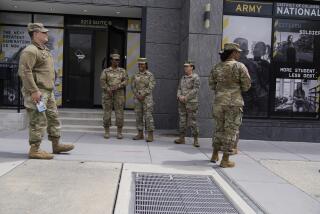Bush’s draft dodge
- Share via
PERHAPS THE ONLY issue in which there is near-total bipartisan unity in Washington is opposition to the draft. Those who oppose continuing the war in Iraq object to the draft for obvious reasons. But supporters of the president’s Iraq policy should not get off so easily.
By vetoing the initial Iraq war supplemental spending bill because it contained a timetable for withdrawal, President Bush clearly believes that a substantial number of U.S. troops will be needed in Iraq for an indefinite period of time. But how are we going to sustain operations in Iraq beyond 12 to 18 months? The president insists that setting a withdrawal timetable will tie the hands of commanders on the ground, but it is not the timetable that will tie their hands. It is the breaking of the U.S. Army.
Currently, our ground forces, specifically the Army, are stretched to their limits. Our soldiers and Marines have been fighting in Iraq for more than four years and in Afghanistan for almost six. To meet the demands of the president’s surge, the Army is scrambling to find enough troops. Secretary of Defense Robert M. Gates has already been forced to extend tours for soldiers serving in Iraq from 12 to 15 months. Soldiers are being sent back to Iraq for their second and third deployments; some have not even been home a year before being sent back. Many new recruits are being sent into intense combat in Baghdad without proper training. And in some cases, the Army has been so desperate that, as Mark Benjamin of Salon magazine first reported, it is even forcing injured soldiers back into combat before they have adequately recovered. Retired Army Gen. Barry McCaffrey recently remarked that “the ground combat capability of the U.S. armed forces is shot.”
Meanwhile, the National Guard is in even worse shape. The head of the National Guard has said that 90% of the Army National Guard is poorly equipped, raising real questions about the Guard’s ability to respond to disasters like Hurricane Katrina and the tornado that wiped out Greensburg, Kan. Yet more than 13,000 Guardsmen have been notified that they likely will be sent back to Iraq in 2008.
The Army was simply not built to fight protracted ground wars like the one in Iraq. After the draft was ended in 1973, the current all-volunteer system was created out of the mind-set of “no more Vietnams.” The Army was intended to be a small, highly trained fighting force that would act in an initial-response capacity to repel and counter the Soviets or other aggressors.
In the event of a major conflict, the active-duty Army would be supported in the short and medium term by the National Guard and Reserves. But if a conflict were to grow in length or intensity, the Army would revert to the draft. The all-volunteer force was not put in place to be an alternative to conscription but was intended to be a bridge to it. This is why we require young men to register with the Selective Service System when they turn 18.
Although the president and his administration have insisted that operations in Iraq will be difficult and will take a long time, Bush has done nothing to seriously prepare for such a long-term commitment. Considering the current state of the Army, if the president wants to sustain a substantial number of U.S. troops in Iraq beyond the next 18 months, he should call for reinstating the draft. That would be the responsible path.
Yet the president will never call for the draft. He knows the country would never support the level of sacrifice for this war that implementing a draft would demand. But this is one of the very reasons why the all-volunteer Army was designed the way it was — to prevent a commander in chief from fighting a war that lacks the support of the public.
Instead, the president will lean even more heavily on those who have already served. As a result, troops will be sent back for their third, fourth and fifth deployments; through “stop-loss” orders, soldiers will be prevented from leaving the service even though they have fulfilled their term of duty; deployments will be extended even longer; and the National Guard and Reserves will stay on duty in Iraq, further depleting our already thin domestic response capability.
In the end, the president will not only be unable to stabilize Iraq, he will have destroyed the finest army the world has known.
If the president is committed to fighting the war in Iraq over the long term, instead of simply running out the clock on his presidency, he should have the courage of his convictions and call for reinstating the draft. If not, the only responsible course is to set a timetable to bring the troops home.
More to Read
Get the L.A. Times Politics newsletter
Deeply reported insights into legislation, politics and policy from Sacramento, Washington and beyond. In your inbox twice per week.
You may occasionally receive promotional content from the Los Angeles Times.










